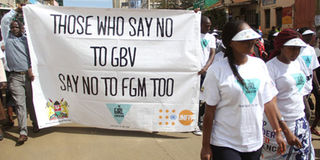Report reveals ‘extensive’ violence against women

Participants march in a procession in Eldoret town during the African Launch of the Girl Generation Campaign to end Female Genital Mutilation on December 10, 2014. A survey put female genital cutting countrywide at 27 per cent despite the existence of the Prohibition of FGM Act 2011. PHOTO | JARED NYATAYA |
What you need to know:
- Globally, one in every three women has been beaten, coerced into sex or abused in some other way “most often, by someone she knows.
- Apart from being launched within the season of the 16 Days of Activism Against Gender-based Violence, the study also coincides with the National Assembly debate on the Domestic Violence Bill, 2014, whose passage into law has been fraught with challenges.
- In blatant abuse of the P3 form, the study found that some victims secure the document, not to pursue their cases in court, but to pressure the offenders to compensate them, usually in the form of a few animals.
A sneak preview of a study on gender-based violence paints a grim picture of the Kenyan situation.
The Peace Initiative Kenya (PIK) project that covers nine of the country’s 47 counties will be launched on Wednesday, hot on the heels of the 2014 edition of 16 Days of Activism against Gender-based Violence.
The study comes against the backdrop of the grisly deaths of the five-member Magu family, which police are investigating. The deaths that stunned the nation eclipsed the wave of stripping incidents targeting women perceived by their molesters to be ill-clad.
Titled, My Action Counts: An Assessment of Gender Based Violence Responses, the study covers Kisii, Kisumu, Kwale, Migori, Mombasa, Nandi, Taita-Taveta, Trans Nzoia and Uasin Gishu counties.
It describes gender-based violence as “an epidemic that is disempowering close to half the country’s female population”.
Quoting from the 2008/2009 Kenya Demographic and Health Survey, the study shows that 45 per cent of women aged 15 to 49 have experienced either physical or sexual violence.
“Nearly half (47 per cent) of those ever married have experienced emotional, physical or sexual violence, while Female Genital Mutilation (FGM) prevalence rate is at 27pc in Kenya”, the report says.
DOMESTIC VIOLENCE BILL
Globally, one in every three women has been beaten, coerced into sex or abused in some other way “most often, by someone she knows. One woman in four has been abused during pregnancy”.
Apart from being launched within the season of the 16 Days of Activism Against Gender-based Violence, the study also coincides with the National Assembly debate on the Domestic Violence Bill, 2014, whose passage into law has been fraught with challenges.
As of October, the Bill had gone through the second reading and stakeholders were working on comments from MPs in preparation for the third reading.
Commenting on the Domestic Violence Bill in an earlier interview with the Nation, Nyeri Woman Representative Priscilla Nyokabi, who is also the vice-chairperson of Parliament’s legal affairs committee, she described as “very sad” some arguments of a section of male committee members.
She noted that some of the very educated committee members, and lawyers to boot, were arguing that “it is in the African culture to chastise wives”; and that criminalising domestic violence was tantamount to borrowing from the West.”
Despite the great hope enactment of the Domestic Violence Bill offers, the PIK study is a reality check, as it exposes the boulders on the road to implementation of related laws, notably the historic Sexual Offences Act.
INADEQUATE RESOURCES
From police stations where supposedly free P3 forms go for as much as Sh500, to health centres where overstretched staff have no time or expertise to fill in the forms, enforcement of the Sexual Offences Act is steeped in challenges.
Not only that; the study found that except in level five hospitals, county health facilities had neither the capacity nor budgets to handle domestic violence.
PIK gender specialist Joyce Muchena notes in the foreword to the study that although the findings are based on nine counties, most institutions in Kenya are ill-equipped to offer adequate, affordable, and accessible services to GBV survivors.
The study notes that despite the high prevalence of GBV and acknowledgement of its impact, “the issue has neither been addressed in the legislative agenda of county assemblies nor are there budgetary provisions for the same, particularly in regard to county service delivery plans.”
And yet, tackling domestic violence is complex as it encompasses social, health, legal, security and developmental dimensions. The study found that most cultures in the study areas balk at the idea of reporting domestic violence, and especially incest, because of the stigma.
FGM COVER UP
Hence, although the Sexual Offences Act prohibits out-of-court settlement of sex-related cases, most families opt for community elders’ interventions, which tend to shield perpetrators to the victims’ disadvantage.
In blatant abuse of the P3 form, the study found that some victims secure the document, not to pursue their cases in court, but to pressure the offenders to compensate them, usually in the form of a few animals.
The study also found widespread cover-up of female genital mutilation. In Kisii County, for instance, where the practice is a time-honoured cultural practice, discussion of the subject in the County Assembly is shunned since Ward Representatives opposed to FGM risk being bundled out by voters.
The survey put female genital cutting countrywide at 27 per cent despite the existence of the Prohibition of FGM Act 2011.





